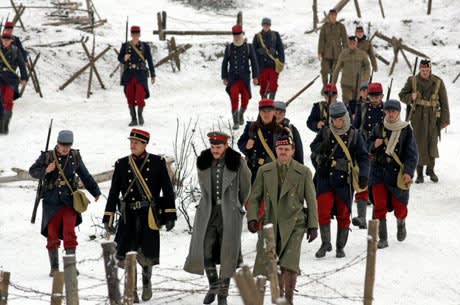With an initial nod to childhood educational brainwashing and a leap into the irrational and incoherent mess that is war, Joyeux Noel seeks to examine the inherent humanity of the proletariat whose lives are thrown away in the name of privileged, global pissing contests. While the fulcrum of artistic expression and holiday spirit uniting an embattled mankind is perhaps a little tidy and convenient, the end result is nothing of the sort, exposing commonality but not resolving conflict, rather pointing out a lack of individuality and personal significance in a culture that claims to champion it. This message, amongst others, comes from the true story of soldiers on the front lines of WWI, who laid down their weapons on Christmas Eve of 1914 to collectively celebrate the holiday and enjoy a moment of freedom. The steps to this temporary peace begin with German opera tenor Nikolaus Sprink (Benno Furmann) and his visiting Dutch opera-singing girlfriend (Diane Kruger) belting out "Silent Night to entertain German troops. Overhearing this, a Scottish-Anglican priest named Palmer (Gary Lewis) pipes up with his bagpipes to support their singing, which leads to a festive agreement amongst the French, Scottish and Germans for a little football, drinking and merry conversation. If slightly contrived, Joyeux Noel proves powerful and affecting regardless, painting a portrait of human folly and beauty with a single stroke. The two-disc DVD includes an entire supplementary disc of special features. On the first disc, a directors commentary track is included with the film that is thorough and inclusive, pointing out amusing factoids about production realities and plot decisions with broken English. The bonus disc includes an hour-and-ten-minute "making of featurette that chronicles the production from beginning to end, and continues onto the theatrical premiere and critical response. In addition, a 40-minute featurette is included that focuses on the music, along with an interview with director Christian Carion, which covers much of the same information as the commentary and "making of.
(Seville)Joyeux Noel
Christian Carion

BY Robert BellPublished Nov 20, 2008



